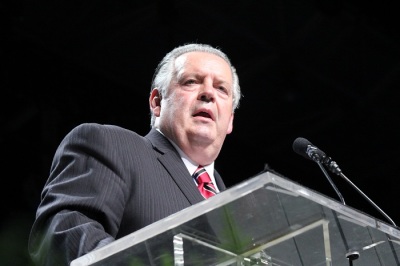Ask Dr. Land: How should Christians disagree about important things?

This past week the Evangelical world has reverberated with a debate by two of Evangelicaldom’s most illustrious, influential, and popular theologians: John Piper and Wayne Grudem. On October 22, John Piper wrote an article, “Policies, Persons, and Paths to Ruin: Pondering the Implications of the 2020 Elections.” In which he explains why he would not be voting for Biden or Trump and noted in a tweet that “the reasoning really matters.” Piper’s article ignited a firestorm of discussion on social media.
On October 27, Wayne Grudem wrote an in-depth response to Piper, “A Respectful Response to My Friend John Piper about Voting for Trump,” which appeared in The Christian Post. I won’t try to summarize what they said. They did that themselves, succinctly and with clarity and passion. They were both clearly aware that they were in disagreement about profoundly important issues.
And yet, they were respectful and well-mannered. They did not allow their substantive disagreements to escalate to rancor and to degenerate into personal attacks.
In fact, prior to Grudem publishing his response, he sent a copy to his friend of many years, John Piper, for comments. Piper responded that Grudem “had represented him fairly” and “that he counted me as a dear friend.” Grudem explained that then Piper in a pure “Piperesque” touch “pointed out how I could make one of my arguments stronger.”
Piper and Grudem do have very significant and differing points of view on the issue of the 2020 election (and in the interest of full disclosure, I think Grudem gets by far the better of the argument). You can read these positions for yourselves and draw your own conclusions.
The most important part, however, of this Piper-Grudem debate is that it models how Christian brothers and sisters should be able to debate and discuss substantive and important issues of disagreement (“iron sharpeneth iron,” Prov. 27:17) and do so in a manner that honors Christ. Unfortunately, this model of civility and respect for differing viewpoints is far rarer than it ought to be in today’s Christendom.
Once again, in the interest of full disclosure, I have met both men, but I have a far more developed relationship with Dr. Grudem. I do try to read everything they both write since both are such excellent writers, even though my theological perspective is somewhat different than theirs.
One of the most interesting things about the Piper-Grudem debate is that both men’s theology tells them that God “decreed” or “ordained” who was going to win next Tuesday’s presidential election before the foundation of the world, while I merely believe that He always knew the outcome as a function of His omniscience, not necessarily His omnipotence.
In conclusion, I am extremely grateful to Dr. Piper and Dr. Grudem for providing such an inspiring model of how Christian brothers can disagree in a way that honors our Savior and His Kingdom. I must confess that I had started to pen a response to Dr. Piper’s piece before I read Dr. Grudem’s response. Alas, my column was not as elevated in tone as Dr. Grudem’s, and so I am grateful to have this positive influence on my attitude.
Finally, let us always remember that even if the candidate we support does not win next Tuesday, God is still on His throne. God may send judgment to America, but God’ church will continue on “and the gates of hell shall not prevail against it” (Matt. 16:18).
Dr. Richard Land, BA (magna cum laude), Princeton; D.Phil. Oxford; and Th.M., New Orleans Baptist Theological Seminary, was president of the Southern Baptists’ Ethics & Religious Liberty Commission (1988-2013) and has served since 2013 as president of Southern Evangelical Seminary in Charlotte, NC. Dr. Land has been teaching, writing, and speaking on moral and ethical issues for the last half century in addition to pastoring several churches. He is the author of The Divided States of America, Imagine! A God Blessed America, Real Homeland Security, For Faith & Family and Send a Message to Mickey.





















